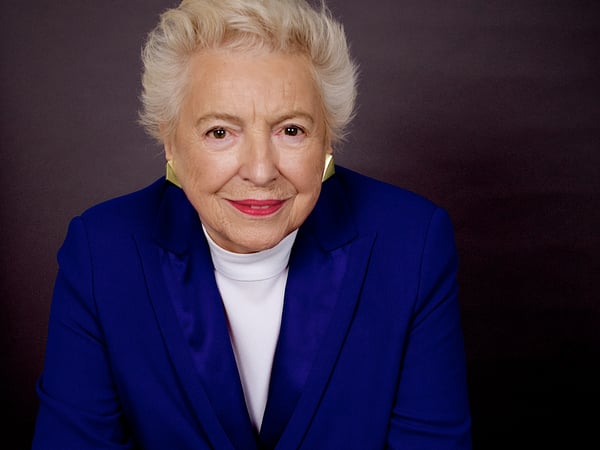“I have to work better today than I did yesterday” – Dame Stephanie Shirley on the ‘new’ world of work
Written by Ann Francke, OBE Monday 10 August 2020
A workplace revolutionary, Dame Stephanie Shirley founded her own software firm in the 1960s, challenging sexual discrimination, employment law and social convention. When the company floated three decades later, she became one of the wealthiest women in Britain and an ardent philanthropist.
As lockdown restrictions ease and offices slowly start to reopen, I spoke to Dame Stephanie about the pandemic’s impact on working practices and women. Here are the highlights from our conversation:
Finding your ‘why’
Dame Stephanie came to the UK in 1939 as a Kindertransport child refugee. That traumatic journey at the age of five, to a “new country with a new language, new food and new family”, taught her how to cope with change and made her a resilient leader. “I’ve lost my son. I’ve had cancer. Nothing that life throws at me can compare to that refugee experience,” she says.
Her early childhood motivated her adult career. “I’ve always felt the need to justify why I was saved from the Holocaust when so many others, including more than one million children, died,” she explains. “I have to make mine a life that was worth saving. I have to work better today than I did yesterday.”
Breaking the rules
Sick and tired of “bumping up against the glass ceiling”, Dame Stephanie set up Freelance Programmers (now part of the Sopra Steria Group) from her dining table when she was 29. The company was radical for its time: its employees were nearly all women and they mostly worked from home. “It started off as a crusade for women,” she says. “The company was flexible and family-friendly to the extreme.”
Dame Stephanie built a business that was agile, responsive and – crucially – productive. “We weren’t travelling. We weren’t wasting time by the watercooler. We were simply getting on with the work.”
She believes that lockdown has finally forced a shift in attitudes towards homeworking. “Companies have had to experiment with it and adapt to it – and they’ve found it to be an efficient way of working. We’ve moved further in the past ten weeks than in the past ten years.”
Women set back
While workplace practices are advancing, UK society is regressing as women bear the economic brunt of the pandemic. “Women are more likely to have been furloughed and lost their jobs than men, and they’ve shouldered the majority of domestic work and childcare,” says Dame Stephanie, who went under the pseudonym "Steve" on business letters, just so she could get her foot in the door.
“In a rather nasty way, we seem to have slipped back to a lifestyle that I remember from the 1950s, where the ‘little woman’ ran the household and the man was the breadwinner.”
Revolting against retirement
Aged 86, Dame Stephanie says she “doesn’t really believe in retirement”. Now a venture philanthropist, she devotes her time to supporting strategic projects in the field of autism, from which her late son Giles suffered acutely.
Her autobiography Let it Go is being made into a film – with Emily Blunt and Claire Foy currently vying for the role of Dame Stephanie – and she’s currently penning a new book called So to Speak, featuring a collection of her speeches.
“I still want to work. I still want to give away my money, wisely. I still want to make new things happen.”
You can watch our full discussion here, and check out our previous Better Managers Briefing series where I speak to other key leaders from all around the UK.
You might also like these posts on this topic:
“As managers, we can help improve the UK economy”
Simon Takel CMgr FCMI on how CMI resources help him navigate change in the further education sector
Pink suits and ice-breakers: what we learned at CMI Communities Live, Birmingham
Experts gathered in the West Midlands to share their ideas for future-proofing leadership
Why leaders must champion digital skills in Northern Ireland
Digital skills gaps present challenging questions for managers, writes Dr Steven Egan fCMgr
“The best leaders set a clear direction and empower staff”
Andrew Stephenson CMgr FCMI is an HR expert who believes in the power of employee engagement and well-trained managers
Don’t miss out - get notified of new content
Sign-up to become a Friend of CMI to recieve our free newsletter for a regular round-up of our latest insight and guidance.
CMI members always see more. For the widest selection of content, including CPD tools and multimedia resources, check out how to get involved with CMI membership.
Interview
At CMI, we’re hugely privileged to have contributed to many people’s management and leadership journeys. Take a look back at some of the people we’ve interviewed for some top tips and exclusive insight.
Members See More
CMI Members have access to thousands of online learning and CPD resources. Learn more about our membership benefits
Join The Community
CMI offers a variety of flexible membership solutions, tailored to your needs. Find out more and get involved in the CMI community today.
